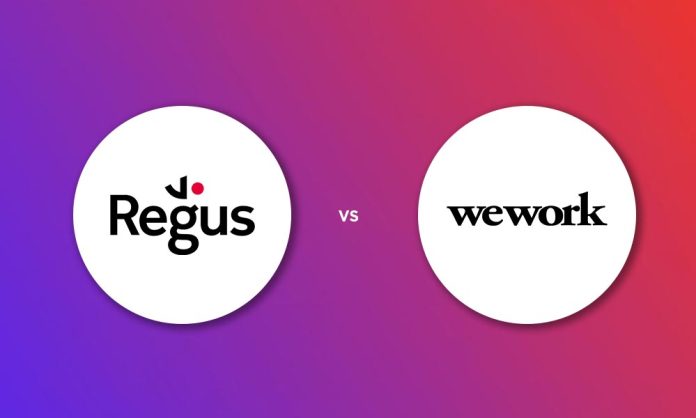
The competition between Regus vs WeWork in the competitive coworking space market continues to captivate professionals across the globe. Both behemoths are moving quickly to seize market share and meet the changing demands of freelancers, well-established businesses, and remote workers as 2024 draws to a close.
Regus: Steadfastness in Tradition
An old hand at coworking spaces, Regus continues to be a reliable source for flexible office solutions. Regus provides its customers with a sense of dependability and consistency thanks to its vast global network of locations. The business has reaffirmed its dedication to adaptability in 2024 by launching modern amenities and tech-enhanced workspaces designed to promote productivity and teamwork.
WeWork: Innovation at the Helm
On the other hand, WeWork, which is renowned for its inventive culture and disruptive methodology, keeps pushing the limits of traditional coworking. WeWork, which embraces the idea of community-driven workspaces, will introduce ground-breaking programs in 2024 with the goal of encouraging relationships and innovation among its members. WeWork aims to create a dynamic environment that fosters inspiration and growth, going beyond just renting out office space. Examples of this include specially designed wellness programs and carefully planned networking events.
2024 Trends: Divergence and Convergence
It’s clear from looking more deeply into the Regus vs. WeWork dynamics of 2024 that each competitor has certain advantages. Regus appeals to people looking for consistency and a tried-and-true method, but WeWork is for the forward-thinkers and trailblazers who want an environment that promotes creativity.
What is better than WeWork?
It truly depends on your own requirements and inclinations. However, a few WeWork substitutes that are well-liked by particular demographics are as follows:
- Spaces: Spaces focuses on fostering strong neighborhoods within their locations while providing a comparable array of amenities and flexible workspace options. They frequently place a strong emphasis on encouraging member collaboration and design.
- TechSpace: Targeting tech startups and companies, TechSpace provides fully equipped office spaces with a focus on technology infrastructure and support services tailored to the needs of tech-driven businesses.
- Serendipity Labs: With a focus on hospitality and service, Serendipity Labs offers upscale coworking spaces that prioritize comfort, professionalism, and a high level of customer service.
- Industrious: Known for its premium, hospitality-driven approach, Industrious provides high-quality, curated workspaces designed to cater to professionals seeking an elevated coworking experience.
- The Yard: The Yard provides boutique coworking spaces with a strong focus on design aesthetics, community events, and networking opportunities, making it the perfect choice for creatives and independent contractors.
Compare Regus vs. WeWork
Of course! This is how Regus vs WeWork compare:
Regus:
- Built Presence: Regus has a large global network of locations and has been a longstanding player in the coworking space. Its vast experience gives it a sense of stability and dependability.
- Traditional Approach: Regus tends to focus on providing professional, no-frills office spaces with essential amenities. Its spaces cater to a wide range of businesses, from freelancers to large corporations.
- Flexibility: With various membership options and lease terms, Regus offers flexibility for businesses of all sizes. Whether you need a short-term solution or a long-term lease, Regus has options to accommodate your needs.
- Professional Atmosphere: Regus spaces typically maintain a professional ambiance, making them suitable for businesses that prioritize a quiet, focused work environment.
WeWork:
- Innovative Culture: WeWork is known for its innovative and vibrant approach to coworking. It emphasizes community-building, networking, and collaboration among its members.
- Modern Amenities: WeWork locations are outfitted with modern amenities and trendy decor to foster a dynamic and inspiring work environment. From artisanal coffee bars to cutting-edge meeting rooms, WeWork locations provide a variety of amenities to enhance the coworking experience.
- Entrepreneurial Spirit: WeWork fosters an entrepreneurial spirit and encourages creativity and experimentation among its members. It often hosts events, workshops, and networking opportunities to facilitate connections and knowledge-sharing.
- Scalability: WeWork offers scalability for growing businesses, with flexible membership options and the ability to easily expand or downsize your space as needed. This flexibility makes it appealing to startups and fast-growing companies.
List of Best 10 Coworking Spaces in 2024
- WeWork
- Regus
- Spaces
- Industrious
- Serendipity Labs
- TechSpace
- The Yard
- Knotel
- Impact Hub
- Mindspace
The Verdict: Choosing Your Workspace Wisely
The choice between Regus vs WeWork ultimately comes down to personal taste and organizational needs. Both Regus and WeWork provide attractive solutions designed to satisfy the various demands of today’s workforce, regardless of your preference for tradition or innovation, dependability or experimentation.
In conclusion, as we navigate through the nuances of coworking in 2024, one thing remains certain: the rivalry between Regus vs WeWork continues to fuel innovation, pushing the boundaries of what a workspace can be. So, whether you find solace in the familiar embrace of Regus or seek the thrill of the unknown with WeWork, the choice is yours to make, ushering in a new era of collaborative workspaces.




















